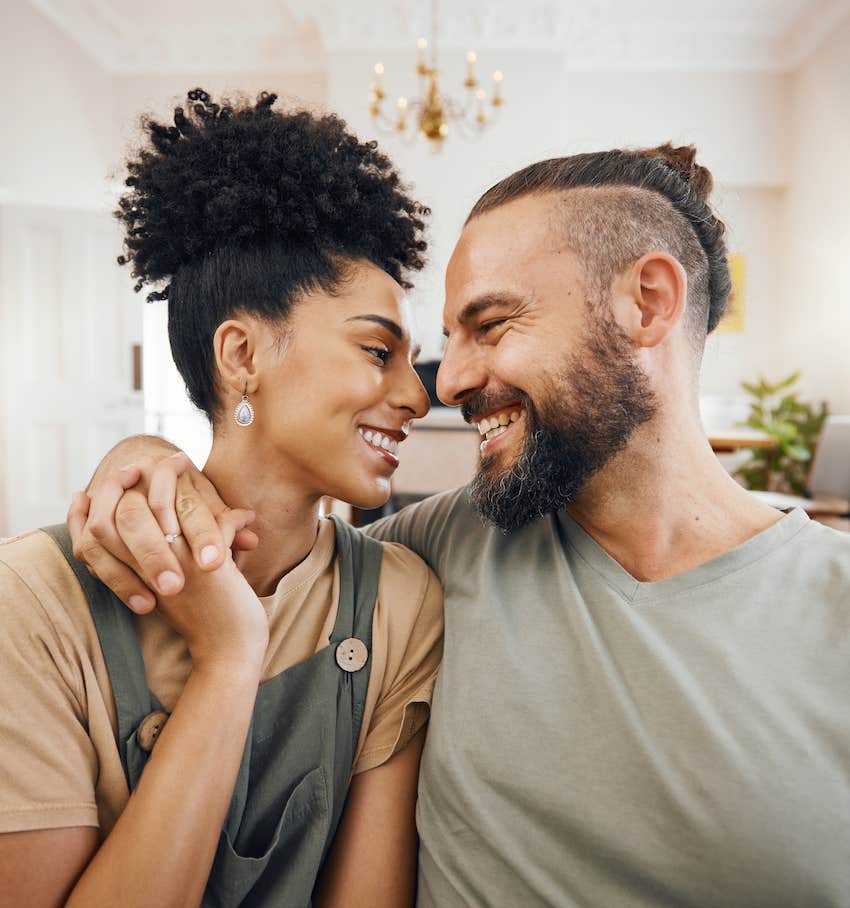The 4 Rare Types Of Intimacy The Happiest Couples Have, According To Psychology
Feel closer than ever with your spouse.
 Hirurg | Canva
Hirurg | Canva Intimacy is complicated and easily misunderstood, by new lovers and those in committed relationships.
There are different types of intimacy people need in a relationship and differing ways we perceive intimacy differently — physically, emotionally, mentally, and spiritually. All four needs are present in every person, though in different proportions and at different times.
Here are the four different types of intimacy every happy couple has
1. Physical intimacy
Some people must begin their intimate connections with touch, whether it is simple affection, deeper nurturing, or sexual interaction. Others are more comfortable sharing their emotions first. They need to know how the other feels about them before they can connect.
People who prefer to initially connect physically feel wanted when their partners give and receive touch that awakens their senses. Touching that is compatible in rhythm, frequency, and style can bring both partners instantly close if both want the same thing in the same way.
Because intimacy is so often correlated with physical touch, this area should be the easiest to talk about first, yet I often find that both new and established partners are not able to honestly share what they want in this domain, especially sexually. Because of the fear of offending or making the other partner feel uncomfortable, many couples develop less-than-optimum physical connections.
The Journal of Social and Personal Relationships helps us understand how partners who are comfortable sharing their most intimate and vulnerable physical touch desires often best heal in this area, especially when their relationship may be wavering in other areas.
“He knows exactly how and when to touch me. When I’m sad, he cradles me. When I’m in the mood for sex, he knows how to get me there. When I’m scared, he reassures me with tender caressing. It’s never too much and never too little. I’m so blessed.”
2. Emotional intimacy
 PeopleImages.com - Yuri A via Shutterstock
PeopleImages.com - Yuri A via Shutterstock
The open sharing of emotional states is for many the most important basis for trust and comfort and must precede any other intimate connection. It is painful to feel more vulnerable than one’s partner, especially in times of need. Knowing that a partner tracks, intuits, understands, and supports the emotional experience of another allows couples to form the foundation from which all other intimate interactions are safe, as supported by a study of intimacy and satisfaction.
If one or both partners need to be known deeply, understood, and accepted before they can be intimate any other way, the other partner(s) must work to make that happen.
“She just gets me. I hardly have to change my expression or sound worried. I don’t know how she understands, but I end up sharing feelings I sometimes didn’t even know I had. I can’t remember a time when she said anything that made me stop talking.”
3. Mental intimacy
 fizkes via Shutterstock
fizkes via Shutterstock
When partners can share their most intimate thoughts, feelings, and motivations, they can create a melding of minds that makes people feel like they live in each other’s minds. When they feel their ideas and opinions truly matter to the other, they automatically share more openly and are more vulnerable:
“He is one complicated guy intellectually and incredibly interesting to me. I look forward to how he thinks and where he gets those fascinating ideas. He cares what I think, too, and takes me seriously when I see things differently. We almost always end up melding our thoughts into new ways of looking at things.”
4. Spiritual intimacy
Spirituality for most is feeling part of something greater than the self that both humbles and enriches the spirit. Partners who feel as if they are doing that together feel solidarity and closeness they cannot achieve any other way. They can do it in a place of worship or under a waterfall in a beautiful forest.
What is important is to capture a common sense of wonder, while feeling simultaneously protected and inspired. Some partners have shared with me they pray or meditate in each other’s presence before seeking intimacy in other ways.
“When she is quiet, I know she’s asking herself deep questions about her life and its purpose. I know she is connecting with a higher being who reminds her of what ethics and values she must live by to give her meaning. I fully respect that relationship. I have a similar place I go, and we share those insights and inspirations. When we do that, it reminds us of how lucky we are to have each other.”
A study on the development of intimacy helps explain how deeply ingrained habits and rituals are hard to challenge. As people approach an interaction they want to change, they must stay conscious and clear in their intent to do it differently than before.
Couples can be lost in confusion when they send each other double messages about when to move closer or offer distance. Fortunately, a couple that has taken the time to truly understand each other’s ways of expressing intimacy can better understand those behaviors.
They can better interpret and more accurately respond to what their partners want and create clearer communications. That does not mean they are automatically obligated to do exactly what is asked, but it does give them guidelines. Even if they can't give everything their partners may want, they can improvise and negotiate new possibilities with that knowledge.
As a beginning, partners can ask each other to share the answers to the following questions. The more extensive and complete their answers, the more they can make decisions about their availability to comply. It is crucial that the partner listening does not invalidate or question the answers; they may be deeply personal and vulnerable and must be respected.
- Physical: How and when do you like to be touched by me?
- Mental: What can we talk about that is interesting and fulfilling to you?
- Emotional: How can I make you feel safe to talk openly about your feelings?
- Spiritual: What gives you meaning in life that you would like to share with me?
When both partners understand each other's thoughts and feelings, and how they are communicated in intimate interactions, they will be more likely to respond accurately to each other’s needs and requests. The old patterns of misunderstanding and frustration will give way to a new kind of closeness.
Dr. Randi Gunther is a clinical psychologist and marriage counselor, who helps singles and couples. She is the author of the newsletter Heroic Love.

